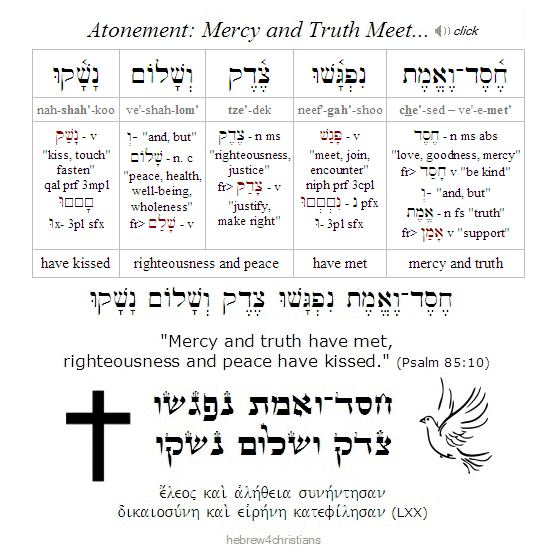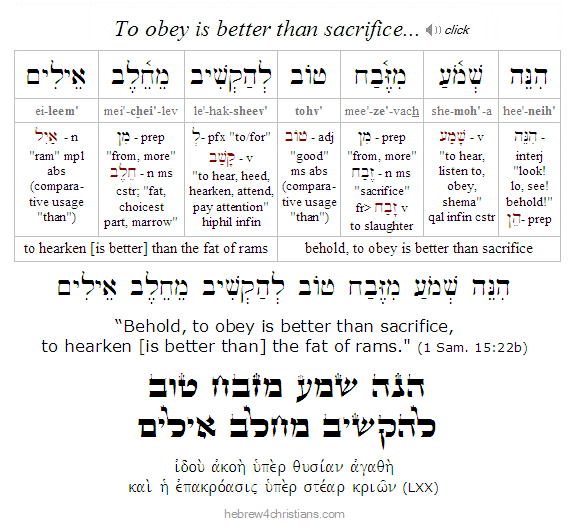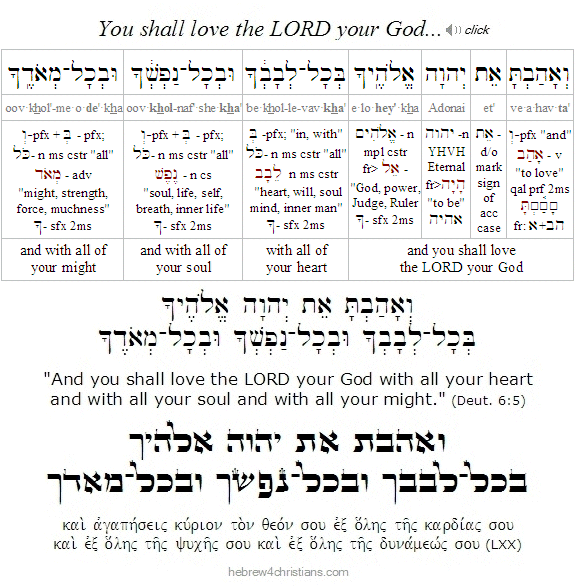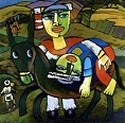|
As I've discussed elsewhere on the site over the years, the climax of the revelation at Sinai was not the giving of the Ten Commandments (עשרת הדיברות) to Israel but was instead the vision of the Altar of the sanctuary (מזבח המשכן). However -- as our Torah portion this week makes clear -- the central sacrifice upon this altar was the daily sacrifice (i.e., korban tamid: קרבן תמיד) of a defect-free male lamb with unleavened bread and wine. The LORD calls this "my offering" (קרבני) and "my bread" (לחמי) [Num. 28:1-8]. In other words, the service and ministry of the Mishkan (i.e., Tabernacle) constantly foretold the coming of the great Lamb of God (שה האלהים) who would be offered upon the altar of the cross to secure our eternal redemption (John 1:29; Heb. 9:11-12).
The sacrifice of the lamb represents "God's food," a pleasing aroma (ריח ניחחי), for it most satisfied the hunger of God's heart (Eph. 5:2). Indeed, Yeshua's offering upon the cross represents God's hunger for our atonement, our healing from the sickness of death, since it restored what was lost to Him through sin, namely, communion with his children. God could never be satisfied until He was able to let truth and love meet (Psalm 85:10).
 |
Sometimes we say that we "hunger for God," but it is vital to remember that it is God who first hungers for us. God desires our love and fellowship. He comes to seek fruit among the trees - but does He find any? He walks in the cool of the day, calling out to us, but are we attuned to hear His voice? Do we accept the invitation to be in His Presence? When God "knocks on the door of your heart" to commune with you, what "food" will you be serving? (Rev. 3:20). Every day we are given an opportunity to "feed God" through expressing faith, hope, and love. Ultimately our obedience to the truth is what "feeds" Him: "Behold, to obey is better than sacrifice, and to hearken than the fat of rams" (1 Sam. 15:22).
 |
We "feed God" by offering heartfelt prayer, by walking in faith, by yearning for Him, by studying Scripture, by participating in corporate worship, by giving tzedakah, by performing acts of kindness (gemilut chasadim) for others, and so on (Heb. 13:15-16). Expressing our love for God is the deepest meaning of teshuvah, which is an "answer" or response to His great love for us (1 John 4:19). Just as God feeds and sustains us through His love, so we "feed Him" by our yearning, our prayers, our praise, and our worship...
God is love, by which we mean that what is ultimately good, fulfilling, and satisfying is Him. But love is meant to be shared. This is suggested by the word for love itself (i.e., ahavah: אהבה), the gematria of which is thirteen (1+5+2+5=13), but when shared it is multiplied: 13 x 2 = 26, the same value for the Sacred Name (יהוה), i.e., (10+5+6+5=26). The Name of the LORD means "He is present," that is, His love constantly imbues, informs, sustains, carries, directs, and rules over the entire universe. God is Presence - He is Life itself. In this connection we see that the Hebrew word for "life" is chayim (חַיִּים), which is written in the plural to imply that life cannot be lived alone but must be shared. Notice that within the word itself are embedded two consecutive Yods (יי), representing unity in plurality (Yod-Yod is an abbreviation for YHVH). God is therefore called Elohim Chayim (אֱלהִים חַיִּים), "the Living God," since we only come to life through our union with Him. Yeshua alone is the means of receiving the divine life: "Whoever has the Son has the life (הַחַיִּים); but whoever does not have the Son of God does not have the life" (1 John 5:12).
"Not only do we know God by Jesus Christ alone, but we know ourselves only by Jesus Christ. We know life and death only through Jesus Christ. Apart from Jesus Christ, we do not know what is our life, nor our death, nor God, nor ourselves."- Blaise Pascal
Love is the very first thing, the principal reason for all of existence. We believe that ultimate reality is personal, redemptive, and inherently loving... This is alluded to in the very first letter of the Hebrew alphabet, the letter Aleph (א), which is constructed from two Yods (that represent "hands") joined by a diagonal Vav (that represents man). One Yod (י) reaches upward while the other reaches downward, and both extend from the "fallen" Vav (ו), picturing a "wounded Man" or Mediator (1 Tim. 2:5). In the Hebrew numbering system (i.e., gematria), Yod = 10 and Vav = 6, so adding up the three parts of Aleph yields 26, again, the very same value as the Name of the LORD: YHVH (יהוה). All of this linked together, chaverim. The very first letter of the alphabet, then, pictures the loving LORD who mediates heaven and earth so that we can experience and know His great love...
וְאָהַבְתָּ אֵת יהוה אֱלהֶיךָ בְּכָל־לְבָבְךָ
וּבְכָל־נַפְשְׁךָ וּבְכָל־מְאדֶךָ
ve'a·hav·tah · et · Adonai · e·loh·hey'·kha · be'khol · le·vav·kha
oov'khol - naf'·she·kha · oov'khol - me·o·de'·kha

"You shall love the Lord your God with all your heart
and with all your soul and with all your strength" (Deut. 6:5)


And may it please the Lord our God to give us the "hunger of God," a spiritual desire and yearning that can only be satisfied by loving Him in the truth. Amen.
|






